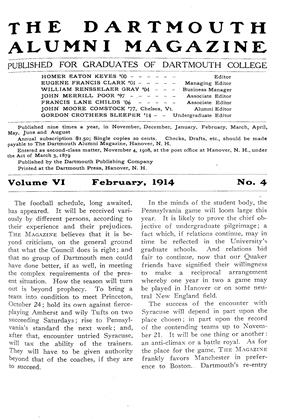has appeared. It will be received variously by different persons, according to their experience and their prejudices. THE MAGAZINE believes that it is beyond criticism, on the general ground that what the Council does is right; and that no group of Dartmouth men could have done better, if as well, in meeting the complex requirements of the present situation. How the season will turn out is beyond prophecy. To bring a team into condition to meet Princeton, October 24; hold its own against fierceplaying Amherst and wily Tufts on two succeeding Saturdays; rise to. Pennsylvania's standard the next week; and, after that, encounter untried Syracuse, will tax the ability of the trainers. They will have to be given authority beyond that of the coaches, if they are to succeed.
In the minds of the student body, the Pennsylvania game will loom large this year. It is likely to prove the chief objective of undergraduate pilgrimage; a fact which, if relations continue, may in time be reflected in the University's graduate schools. And relations bid fair to continue, now that our Quaker friends have signified their willingness to make a reciprocal arrangement whereby one year in two a game may be played in Hanover or on some neutral New England field.
The success of the encounter with Syracuse will depend in part upon the place chosen; in part upon the record of the contending teams up to November 21. It will be one thing or another: an anti-climax or a battle royal. As for the place for the game, THE MAGAZINE frankly favors Manchester in preference to Boston.. Dartmouth's re-entry into the Hub, it would seem, should signalize a meeting of rivals who have previously tested each others' strength, and have old scores to settle. Further, New Hampshire, other things being equal, is entitled to a big Dartmouth game, such as is promised in the meeting with Syracuse.
Nevertheless it is one thing to. prate of fitness; and another to foot the bills. And New Hampshire is entitled only to so large a game as it can support. Somehow or other the expenses for athletics must be met. It is the business of the Council to see that they are; and to take the fewest risks in the process. Probably a sufficient guarantee fund would very quickly settle the question of the place for the final game; for it would provide an invulnerable foundation for argument.
Unfortunately THE MAGAZINE has no guarantee fund. Hence it proposes, as usual, to back the ultimate judgment of the Council.
Comparatively few Dartmouth alumni pursue the vocation of letters as a career; but it is quite surprising how many of them write books that are worth while. No review could do justice to Mr. Parkhurst's charming volume of letters out of Egypt of which THE MAGAZINE published some account last month. Here is a great publisher, a wise counselor, an untiring trustee of a venerable College, revealed to and for his friends with delightful informality. Those who know the man will admire many larger things that he has done; but they will yet cherish his book of letters for what he shows in it of himself; and for what, in its exquisiteness of the printer's art, it displays of loving effort from skilled workmen to give of their best for their chief.
The reprint at this time of an article written during the summer for a New York newspaper, requires no special apology. The article was called forth following the wide publicity produced by the withdrawing of charter from a long-established chapter of a national fraternity. It was the intention of the writer, later in the year, to supplement this contribution with a second which should endeavor more closely to analyze the position of College fraternities east and west, to outline the history of the legislative crusade which has of late been waged against these organizations ; and to suggest, perhaps, some definite means whereby the fraternities might be brought to a proof of utility.
Needless to say, so ambitious a program has not been carried out. But the process of investigation has yielded two discoveries. The first is that the position, reason for being, purposes, and problems of fraternities in the older endowed colleges and universities of the east are considerably different from those of the state institutions to the westward. Among the former, fraternities sprang into being to meet social and intellectual needs; among the latter, they were apparently the outgrowth of imitation, plus the problem of finding satisfactory food and shelter.
The second discovery is a periodical, a modest quarterly, devoted to fraternity—and sorority—matters. Its name is Banta's Greek Exchange. It is published in Menasha, Wisconsin, and costs one dollar per year. Whoever would be informed as to fraternities and all that they signify should read the Exchange. It is particularly to be recommended to undergraduates, and to all in authority over them. The recommendation is the more unreservedly hearty, since it is spontaneous and unasked.
 View Full Issue
View Full Issue
More From This Issue
-
 Article
ArticleTHE STATUS OF COLLEGE FRATERNITIES
February 1914 By Homer Eaton Keyes -
 Class Notes
Class NotesFRANK S. BLACK
February 1914 By WILBUR H. POWERS '75 -
 Class Notes
Class NotesLOCAL ASSOCIATIONS
February 1914 -
 Class Notes
Class NotesCLASS SECRETARIES
February 1914 -
 Article
ArticleNEW QUARTERS FOR THE BANK
February 1914 -
 Article
ArticleTHE STATE OF THE COLLEGE IN 1780
February 1914 By Silvanus Ripley









